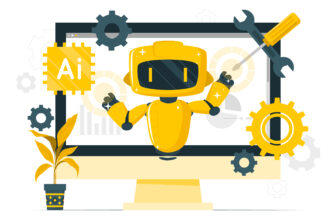
Artificial Intelligence (AI) continues to revolutionize the business landscape in 2024, driving efficiency, improving customer experience, and providing valuable insights across industries. AI tools have become essential in automating processes, analyzing data, and making smarter decisions. For businesses looking to stay competitive, leveraging the right AI tools is key.
 In this blog post, we’ll explore the top 10 AI tools that businesses should consider using in 2024. These tools cover various functions, including marketing, customer service, data analytics, and automation. Whether you’re a small business or an enterprise, this guide will help you choose the best AI solutions to integrate into your operations.
In this blog post, we’ll explore the top 10 AI tools that businesses should consider using in 2024. These tools cover various functions, including marketing, customer service, data analytics, and automation. Whether you’re a small business or an enterprise, this guide will help you choose the best AI solutions to integrate into your operations.
 Key Features:
Key Features:
 Key Features:
Key Features:
 Key Features:
Key Features:
 Key Features:
Key Features:
 Use Cases:
Use Cases:
 Key Features:
Key Features:
 Key Features:
Key Features:
 Key Features:
Key Features:
 By integrating tools like ChatGPT, Google Cloud AI, Salesforce Einstein, and UiPath, businesses can not only enhance efficiency but also improve customer experiences, make smarter decisions, and drive innovation. Moreover, as AI technology continues to evolve, businesses that adopt AI tools early will be better positioned to leverage new developments, such as Explainable AI and multimodal learning, which will shape the future of AI in the coming years.
Actionable Takeaways:
By integrating tools like ChatGPT, Google Cloud AI, Salesforce Einstein, and UiPath, businesses can not only enhance efficiency but also improve customer experiences, make smarter decisions, and drive innovation. Moreover, as AI technology continues to evolve, businesses that adopt AI tools early will be better positioned to leverage new developments, such as Explainable AI and multimodal learning, which will shape the future of AI in the coming years.
Actionable Takeaways:
 In this blog post, we’ll explore the top 10 AI tools that businesses should consider using in 2024. These tools cover various functions, including marketing, customer service, data analytics, and automation. Whether you’re a small business or an enterprise, this guide will help you choose the best AI solutions to integrate into your operations.
In this blog post, we’ll explore the top 10 AI tools that businesses should consider using in 2024. These tools cover various functions, including marketing, customer service, data analytics, and automation. Whether you’re a small business or an enterprise, this guide will help you choose the best AI solutions to integrate into your operations.
1. ChatGPT by OpenAI
Overview: As one of the most advanced AI language models in 2024, ChatGPT is a powerful tool for businesses looking to enhance customer engagement. It can generate human-like text, answer questions, and even create content. Key Features:
Key Features:
- Natural language understanding (NLU) for generating meaningful text and conversations.
- Customizable chatbots for automating customer service and sales inquiries.
- Content creation for marketing, blog posts, and email campaigns.
- Automating customer support with AI-driven chatbots.
- Generating marketing content such as product descriptions and email drafts.
- Assisting with internal communication by summarizing reports and generating insights.
2. Google Cloud AI
Overview: Google Cloud AI offers a suite of machine learning tools and services that allow businesses to build, deploy, and scale AI models. With pre-trained models and custom ML development capabilities, Google Cloud AI supports various business applications, from predictive analytics to voice recognition. Key Features:
Key Features:
- AI and machine learning models for image and speech recognition, translation, and natural language processing.
- AutoML allows non-experts to train models using minimal code.
- Google Cloud Vision API for image analysis.
- Enhancing customer experiences with AI-driven personalization and recommendations.
- Leveraging Google Cloud’s AI analytics to identify trends and patterns in large datasets.
- Building automated visual inspection systems for quality control in manufacturing.
3. IBM Watson
Overview: IBM Watson is a comprehensive AI platform that helps businesses integrate AI into their processes. It offers a variety of AI tools such as Watson Assistant, Watson Discovery, and Watson Machine Learning, allowing companies to create chatbots, extract insights from documents, and develop predictive models. Key Features:
Key Features:
- Watson Assistant for creating conversational agents.
- Watson Discovery for AI-powered search and analysis.
- Watson Machine Learning for building, training, and deploying AI models.
- Developing AI-driven virtual assistants to automate customer service.
- Using Watson Discovery to analyze large volumes of text data for insights.
- Creating predictive models for finance, healthcare, and retail industries.
4. Salesforce Einstein
Overview: Salesforce Einstein is an AI tool embedded within the Salesforce platform. It provides businesses with AI-driven insights, automates routine tasks, and helps predict customer behavior. Einstein is particularly useful for sales, marketing, and customer service teams. Key Features:
Key Features:
- Predictive analytics for sales forecasts and opportunity scoring.
- AI-powered recommendations for marketing personalization.
- Automated workflows that streamline repetitive tasks.
- Predicting sales opportunities based on customer data.
- Personalizing marketing campaigns with AI recommendations.
- Automating customer support workflows to improve service efficiency.
5. HubSpot’s AI Tools
Overview: HubSpot integrates AI tools into its CRM platform, enabling businesses to optimize marketing, sales, and service efforts. From AI-powered content recommendations to predictive lead scoring, HubSpot’s AI features streamline customer engagement and improve efficiency. Key Features:- AI-driven content strategy tools that suggest blog topics and keywords.
- Predictive lead scoring to prioritize high-potential leads.
- Chatbot automation for 24/7 customer support.
 Use Cases:
Use Cases:
- Automating lead qualification and outreach with AI-based predictions.
- Improving customer retention with AI-powered support bots.
- Streamlining content marketing by generating keyword-optimized topics.
6. Hootsuite’s OwlyWriter AI
Overview: OwlyWriter AI is a content creation tool integrated into Hootsuite that helps businesses generate social media posts, captions, and marketing content. Using AI, OwlyWriter produces text that resonates with specific audiences, driving engagement across social platforms. Key Features:
Key Features:
- Automated content generation for social media marketing.
- AI-powered post recommendations based on user behavior and engagement.
- Content optimization for different platforms like Twitter, Facebook, and LinkedIn.
- Simplifying social media management by automating post creation.
- Generating platform-specific content that boosts audience interaction.
- Creating campaign content based on audience insights.
7. Cognitivescale Cortex
Overview: Cognitivescale Cortex is a cloud-based AI platform focused on automating and improving business processes through AI. It offers personalized customer insights, workflow automation, and risk analysis, making it ideal for industries like healthcare, finance, and retail. Key Features:- AI-powered customer engagement tools for personalization.
- Cognitive automation for process optimization.
- Risk analysis to mitigate operational risks using predictive AI.
- Enhancing customer experience with personalized offers and interactions.
- Using AI-driven risk analysis to identify potential issues before they arise.
- Automating back-office tasks such as invoice processing or compliance checks.
8. UiPath
Overview: UiPath is a leading robotic process automation (RPA) tool that combines AI with automation to streamline business operations. It enables businesses to automate repetitive tasks such as data entry, invoice processing, and HR operations, freeing up employees to focus on higher-value work. Key Features:
Key Features:
- AI-powered RPA bots for automating business processes.
- Document understanding to automate data extraction from unstructured documents.
- AI-enhanced automation for intelligent decision-making.
- Automating finance and accounting tasks such as invoicing and reconciliation.
- Streamlining HR processes like onboarding and employee data management.
- Improving supply chain operations by automating order processing and inventory management.
9. Zoho Zia
Overview: Zoho Zia is an AI-powered assistant embedded within Zoho’s suite of applications. Zia can predict sales trends, offer AI-based recommendations, and automate routine tasks, helping businesses improve productivity and customer interactions. Key Features:
Key Features:
- AI-driven sales forecasting and opportunity scoring.
- Sentiment analysis for understanding customer interactions.
- Automated task management to streamline workflows.
- Using AI-powered insights to improve sales performance and customer engagement.
- Analyzing customer sentiment from emails and chat conversations.
- Automating task assignments based on workload and priority.
10. DataRobot
Overview: DataRobot is an automated machine learning (AutoML) platform that enables businesses to build, deploy, and manage AI models with ease. It accelerates the process of developing machine learning models, allowing teams to implement AI solutions without needing deep technical expertise. Key Features:- Automated machine learning (AutoML) for rapid model building.
- Model deployment and monitoring to track performance over time.
- Predictive analytics for business insights.
- Speeding up AI model development for data analysis and forecasting.
- Using predictive analytics to drive decision-making in finance and marketing.
- Monitoring model performance to ensure accuracy and compliance.
Conclusion
The business landscape in 2024 is more AI-driven than ever. By adopting the right AI tools, companies can improve efficiency, enhance customer engagement, and gain a competitive edge. From automating repetitive tasks to generating deep insights through data analysis, the AI tools discussed above cater to a wide range of business needs. Whether you’re in customer service, marketing, sales, or data analytics, there’s an AI tool available that can elevate your operations to the next level. By integrating tools like ChatGPT, Google Cloud AI, Salesforce Einstein, and UiPath, businesses can not only enhance efficiency but also improve customer experiences, make smarter decisions, and drive innovation. Moreover, as AI technology continues to evolve, businesses that adopt AI tools early will be better positioned to leverage new developments, such as Explainable AI and multimodal learning, which will shape the future of AI in the coming years.
Actionable Takeaways:
By integrating tools like ChatGPT, Google Cloud AI, Salesforce Einstein, and UiPath, businesses can not only enhance efficiency but also improve customer experiences, make smarter decisions, and drive innovation. Moreover, as AI technology continues to evolve, businesses that adopt AI tools early will be better positioned to leverage new developments, such as Explainable AI and multimodal learning, which will shape the future of AI in the coming years.
Actionable Takeaways:
- Start Small: Implement one or two AI tools in a specific business function (e.g., customer support or marketing automation) and assess the impact.
- Automate Routine Tasks: Use tools like UiPath or Zoho Zia to free up employee time by automating repetitive, manual processes.
- Leverage Data: Make data-driven decisions using AI tools like DataRobot and Google Cloud AI to analyze customer behavior, forecast trends, and optimize business performance.
- Personalize Customer Interactions: Integrate AI into your CRM with tools like Salesforce Einstein and HubSpot AI to deliver personalized customer experiences and improve engagement.




